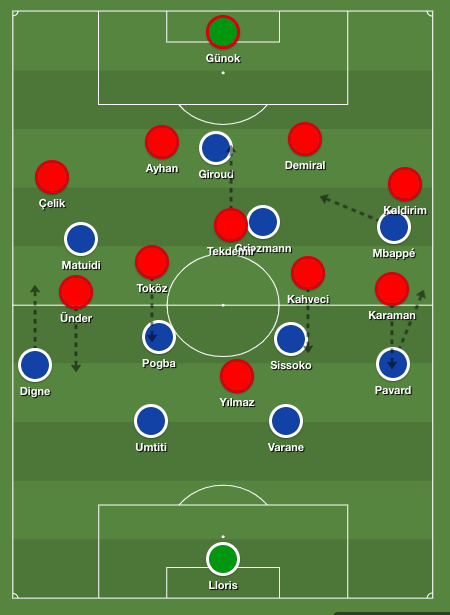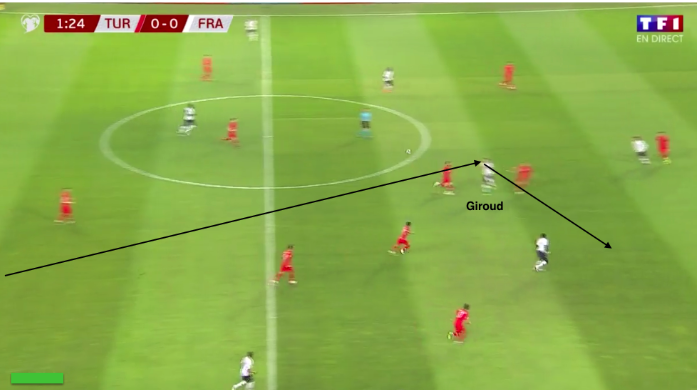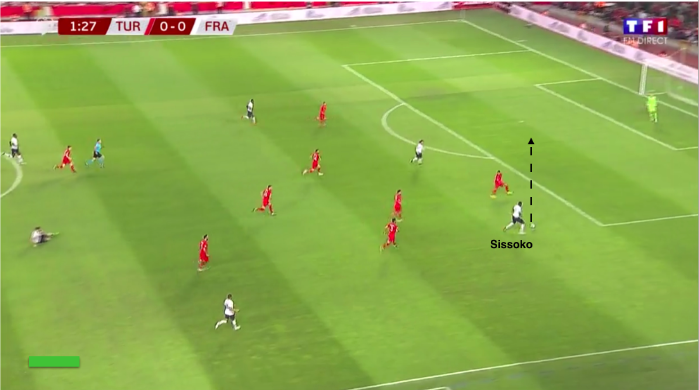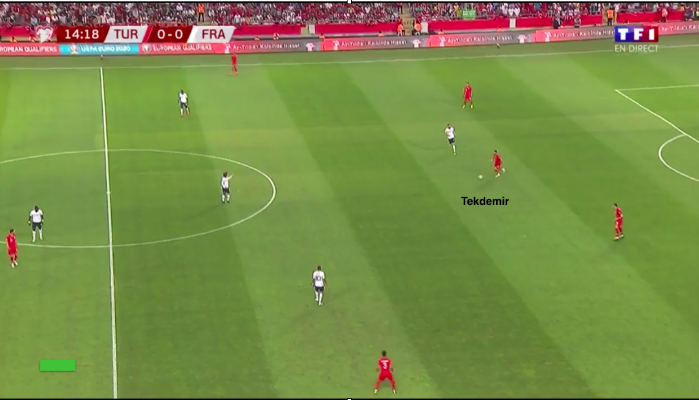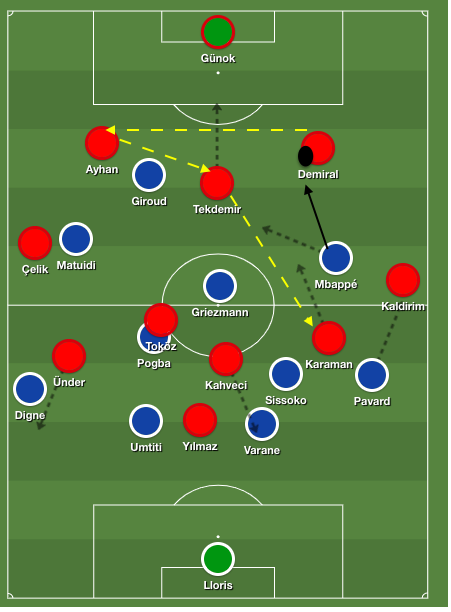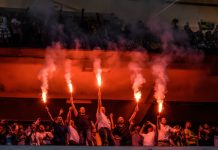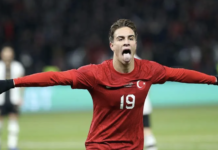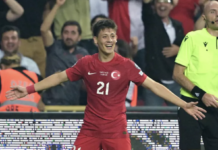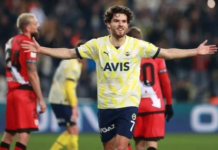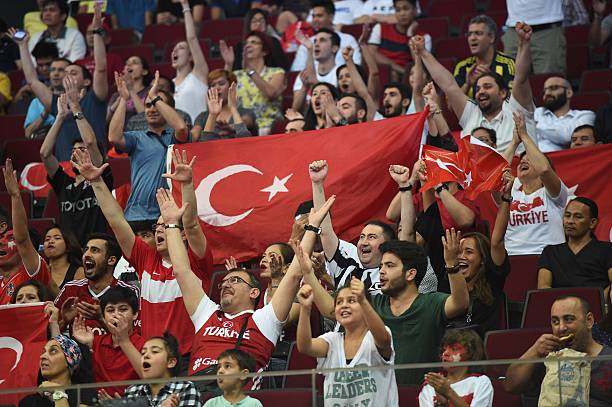
By Abel Meszaros – You can follow him on Twitter and Medium
“We did not turn up and even if we are world champions, if we play like that we have no hope. “We took a good slap tonight. We have to analyse it, we have another match to come in three days.” — Didier Deschamps
France, the World Cup winners, fielded a squad with a Transfermarkt value of 730 million, but got DOMINATED by an experimental Turkish squad of 100 million. Didier Deschamps’ nonexistent plan B in possession (plan A is to counter in transition as we saw in the World Cup) was completely stymied by a mix of poor positional awareness, lack of execution, technical mistakes and a great gameplan by Senol Günes. The result: four shots total for France. That was the total offensive output of the World Cup winners in Torku Arena in a key qualifying match for Euro 2020 in Group H, where the hosts now leapfrogged France to top the group on nine points!
0 – It is the first time in the last 10 years that France ?? did not make a shot on target (4 shots attempted). Disaster.#TURFRA pic.twitter.com/6HOEkPRBMs
— OptaJean (@OptaJean) June 8, 2019
Let’s break the game down in detail, starting with the lineups
Same “old” France, new look Turkey
Aside from Lucas Hernandez, out with knee surgery since December, N’golo Kante was the only notable absentee from France’s World Cup winning lineup. As I recall, Deschamps’ ideas for a possession-based style were abandoned in after the first match of the group stages (squeaking past Australia), as the ineffectiveness of a Griezmann, Dembélé, Mbappé trio was subbed for a 4–2–3–1 hybrid with Giroud up top and Blaise Matuidi joining Griezmann and Mbappé. The idea is to have Giroud make runs behind defenses in sustained possession spells when France builds out of the back, and or use his great combination play with the lightning-fast movement and one-two combos of Griezmann and Mbappé. In addition, Giroud is a smart and dogged defender in pressing and a useful target man in transition, with plenty of ability to lay the ball off to the speedier (I suppose that definition applies to pretty much everyone) teammates.
Sans Kante or Tolisso, the double pivot was occupied by Paul Pogba first and foremost, as the main playmaker. His partner was Moussa Sissoko, whose recent performances for Spurs gave him the nod, much like for left-back Lucas Digne, who started over Real Madrid bound Ferland Mendy. The rest of the backline was the usual Pavard-Varane-Umtiti trio, which provides long-ball playmaking (Varane), line-breaking passing (Umtiti and Pavard) and excellent technical ability/vision (Pavard/Umtiti) in attack, with the requisite athleticism to stop aerial attacks and/or counters. The reliable Lloris kept his position in goal.
The situation for Gunes, returning as full-time manager officially on June 1st, but having coached and won four games as caretaker, was much more complicated. Due to poor form, injuries, lack of playing time, etc he had to do without some big-name players such as Hakan Calhanoglu (bench) Cenk Tosun (knee injury) Emre Belezoglu (injury and age) Yunus Malli (form) or Emre Mor (Instagram). The legendary Burak Yilmaz (who has played for all for big clubs in Turkey and in China) did recover in time to lead the line. Düsseldorf winger Kenan Karaman, scorer of an epic solo goal against Bremen in late April was coming off a great Rückrunde in the Bundesliga, while Roma starlet Cengiz Ünder was probably disappointed to have only ended with seven assists in Serie A in another season where he failed to play 1500 minutes. Their dribbling and defensive discipline would be key throughout the match, as they acted like midfielders in a 4–1–4–1 out of possession, but as wingers in the 4–3–3 with the ball. The midfield featured Mahmut Tekdemir as the single pivot, with two 23 year-olds as the number 8s: Kahveci is the Basaksehir teammate of Tekdemir, while Dorukhan Toköz plays for Besiktas. The back four has been solidly in place for Günes: RB Zeki Celik has had a wonderful season with Lille in France, Merih Demiral has become one of the best CBs in Serie A, while Schalke product Kaan Ayhan is turning heads with Düsseldorf. Veteran LB Hassan Ali Kaldirim would be tasked with the unenviable job of trying to contain Kylian Mbappé.
A first half full of action
The old cliche of teams feeling each other was thrown right out the window in the second minute, as Varane found the deep-dropping Giroud in transition with a long ball. The layoff to Sissoko was excellent and the Spurs player was 2v1 with Griezmann against Ayhan, with just a simple pass to execute:
A wonderful block by Ayhan thwarted the chance and Turkey survived.
Demiral would later thwart a rare transition chance for France, shutting down a 3v2 which saw the Sassuolo CB take on and stop none other than Kylian Mbappe 1v1 in space.
Turkey playing out from the back
Playing against a hyperathletic, if not hyperaggressive pressing team like France, Turkey knew it would have to do an excellent job in maintaining possession. In the early portion of the match, they did this in one of two ways: 1. Moving Tekdemir back into the defensive line to outplay the initial pressing line (Giroud by himself, sometimes joined by the ball/far forward) whenever Gönuk and the two CBs were not enough to do so. You can see it here as the Turkish fullbacks occupy the France wingers, with the two 8s pushed high.
This play would see Karaman in the left halfspace get blocked by Sissoko, but Turkey was able to progress the ball quickly over two French pressing lines, thanks to good movement by Kahveci (occupying Varane) and Toköz (Pogba) and nice execution by Tekdemir.
2. When the middle was closed by France’s defensive orientation, Turkey’s excellent CBs could play outside to the fullbacks
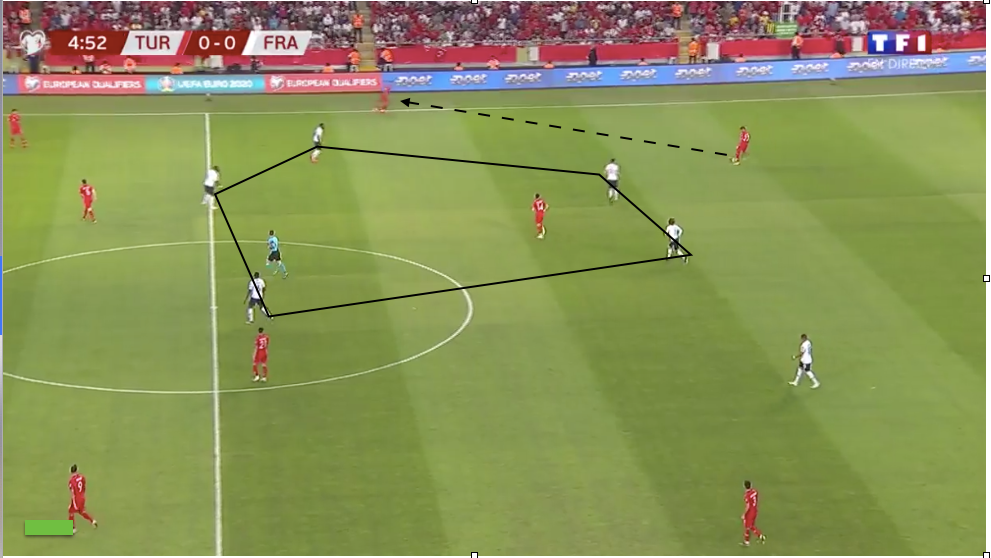
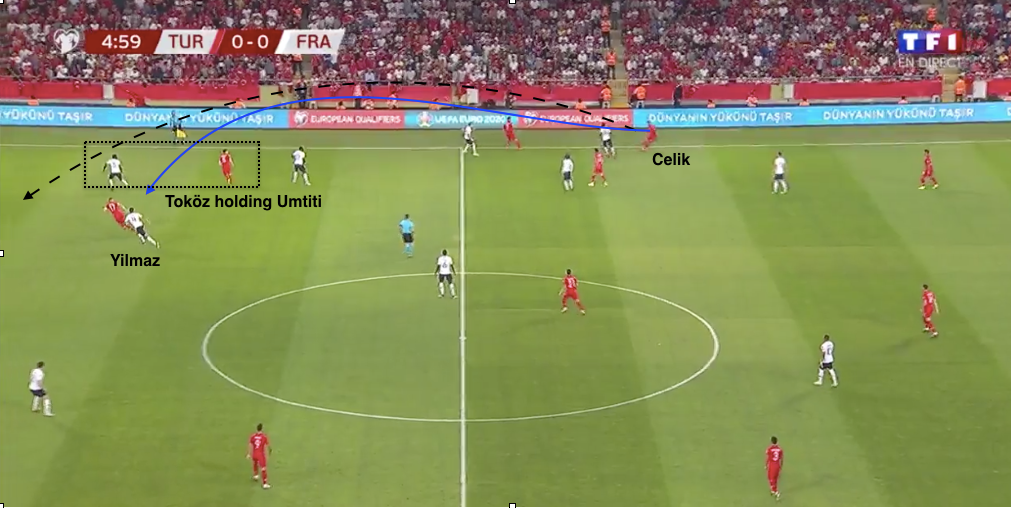
This wing based attack either happened via long-balls over the top to Yilmaz and was an option because Ünder attracted the fullback and Toköz ran deep to hold the CB (Umtiti) and the defensive midfielder (Sissoko). In this example the blue arrow shows the actual pass, but the black arrow showing the deeper pass was also an option, as Yilmaz got away for Varane.
The same pattern was observable on the left side, with Karaman bringing the fullback Pavard with him and opening the space for the no.8 Kahveci, as Kaldirim could play the ball over the top into space.
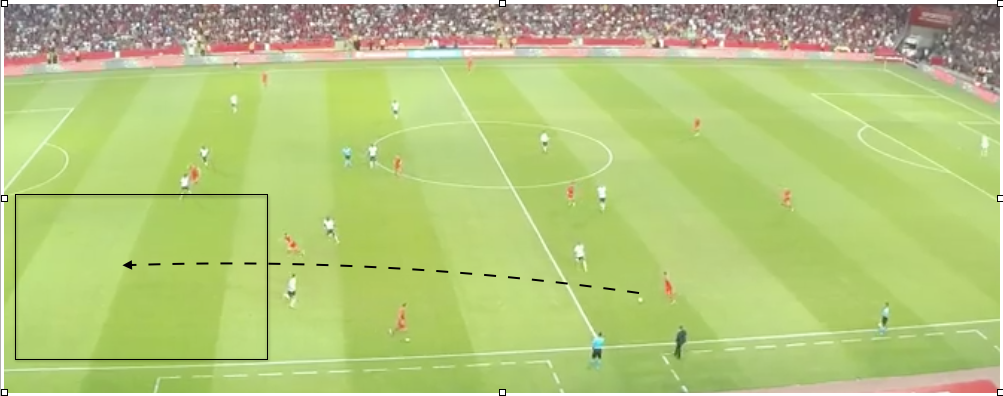
These attacking patterns and the set-piece plus counter threats were a mainstay of Turkey’s gameplan, as we will see later.
Turkey’s compact 4–1–4–1 keeps poorly structured France attack in check
But first, let’s focus on how the hosts were able to keep the mighty France attack to ZERO shots on target and just FOUR shot attempts all game. First, the 4–1–4–1 was very aggressive, narrow (especially in the backline) and compact as you can see below.
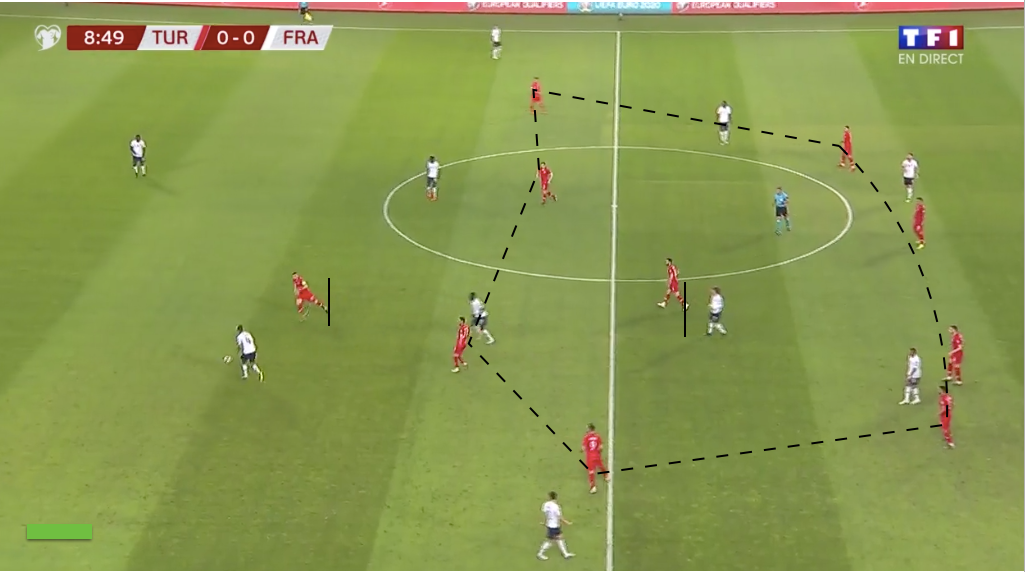
Turkey’s press able to pounce on any missed first touches (and there were several throughout the game from France), and the aggression from Yilmaz, Keraman and the central midfielders was notable.
Second, France’s buildup struggles were well-documented in the WC, but the problems in their offensive structure were SEVERE. First, let’s look at the tactics boards: in both of these cases, France has the ball and their CB, Umtiti, has so few passing options, due to the poor occupation of lines. There are 4–5 French players in the same horizontal line, with the halfspaces unoccupied, giving the team little to no depth. In addition, the positioning of the central midfielders restricts the options for the CBs and allows Turkey to control the middle with 4–5 players.

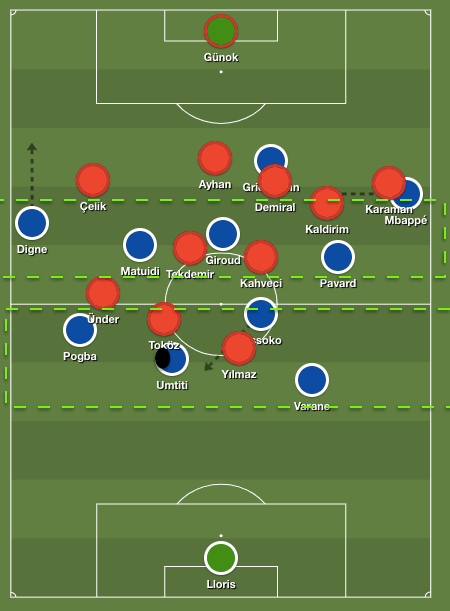
Here is what it looks like on tape:
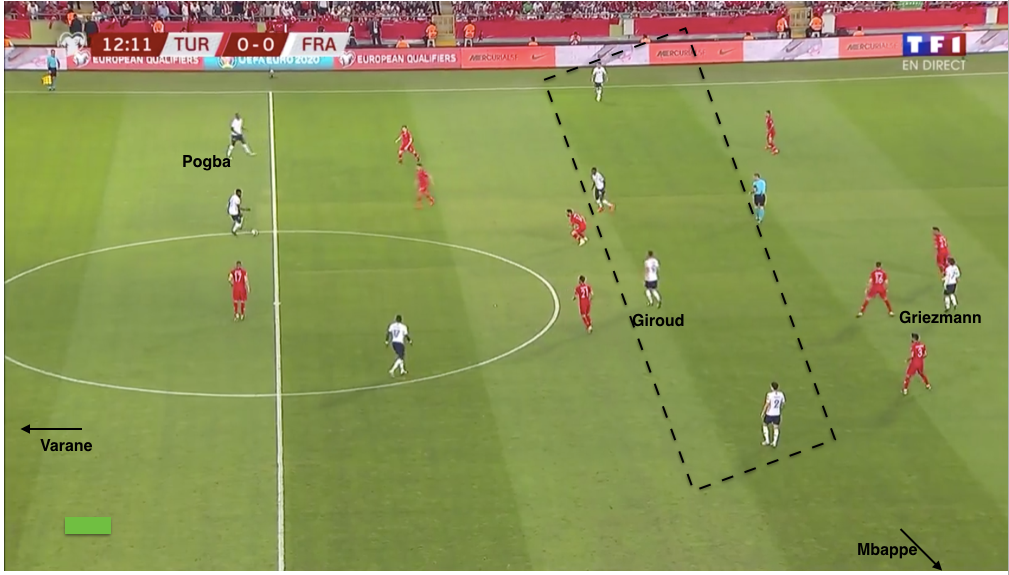
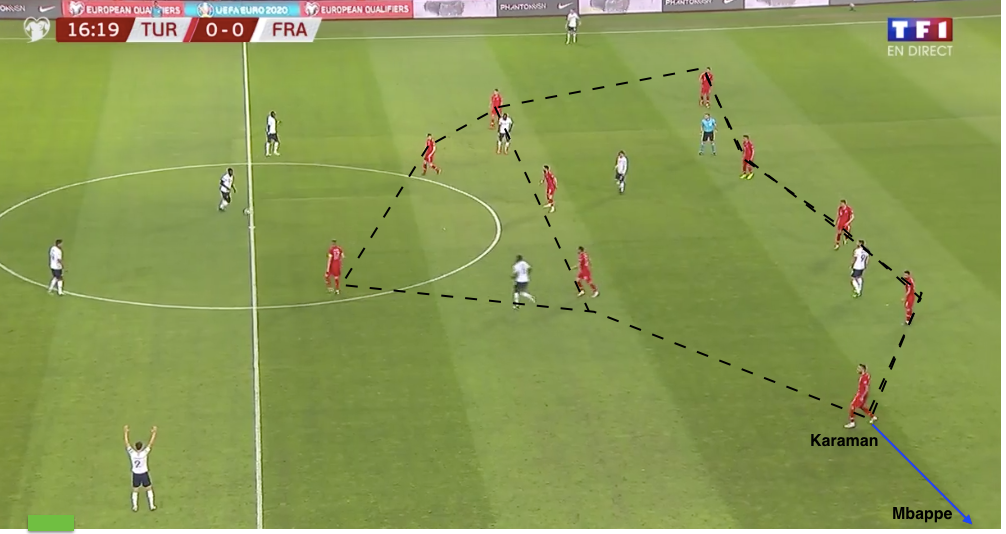
At other times the central areas were completely unoccupied by France, another huge mistake. It’s very hard to generate any attack leading to shots with this kind of spacing.

Later in the first half we saw a repeat of the central congestion\poor horizontal occupation from the two tactics boards. This time I tried to suggest some alternative options, with better spacing and occupation of key areas, that could open up passing options (BLACK) as opposed to the limited ones (BLUE) available with such poor spacing.
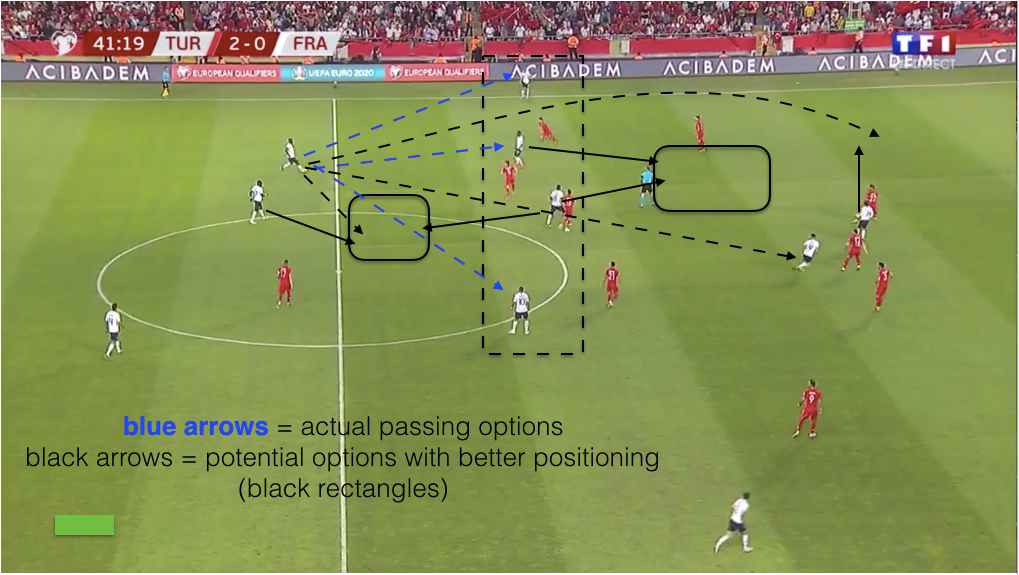
Turkey strike first, build on the lead and have several chances for 3–0
After the key Demiral block, Turkey took the initiative from France with some excellent positional play that is now garnering some Twitter fame:
How do you say Juego de Posicion in Turkish? @Turkish_Futbol1 #TURFRA pic.twitter.com/fVYLAvJjSj
— Abel Meszaros (@BundesPL) June 9, 2019
The goal came from a set piece however, and it was Kaan Ayhan of all people. Perhaps Didier Deschamps and staff would be wise to scout the Bundesliga little more, considering how the Fortuna CB scores regularly and is a major threat from dead balls in the box. Apparently, Benjamin Pavard did not give his teammates the memo, for they left him wide open for the opening goal:
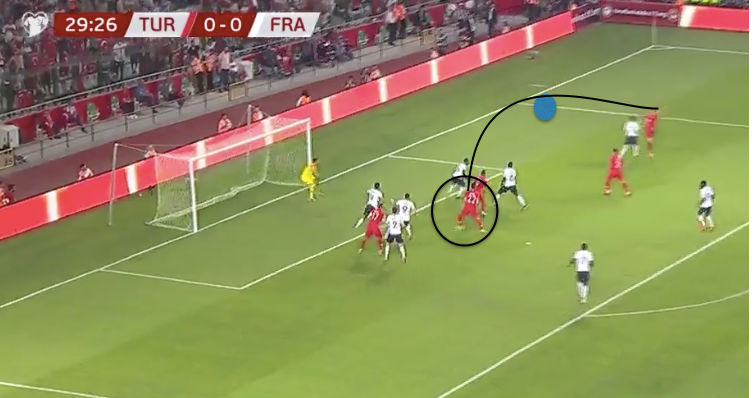

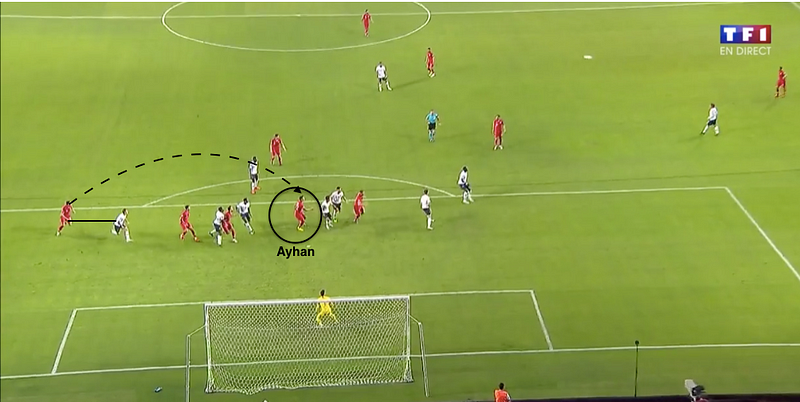
France did react with more awareness and Pogba was able to pass through the Turkish midfield for once: Matuidi progressed the ball to Mbappé, but as it so often was the case on Saturday, things did not work out for the twenty-year-old. Mbappé, previously stranded on Karaman Island on the right, moved more centrally, Griezmann moved towards the middle and Sissoko also pushed higher. Yet, France suffered from a shocking lack of balance in the first half: Digne was uninvolved, while Pavard soaked up possession.
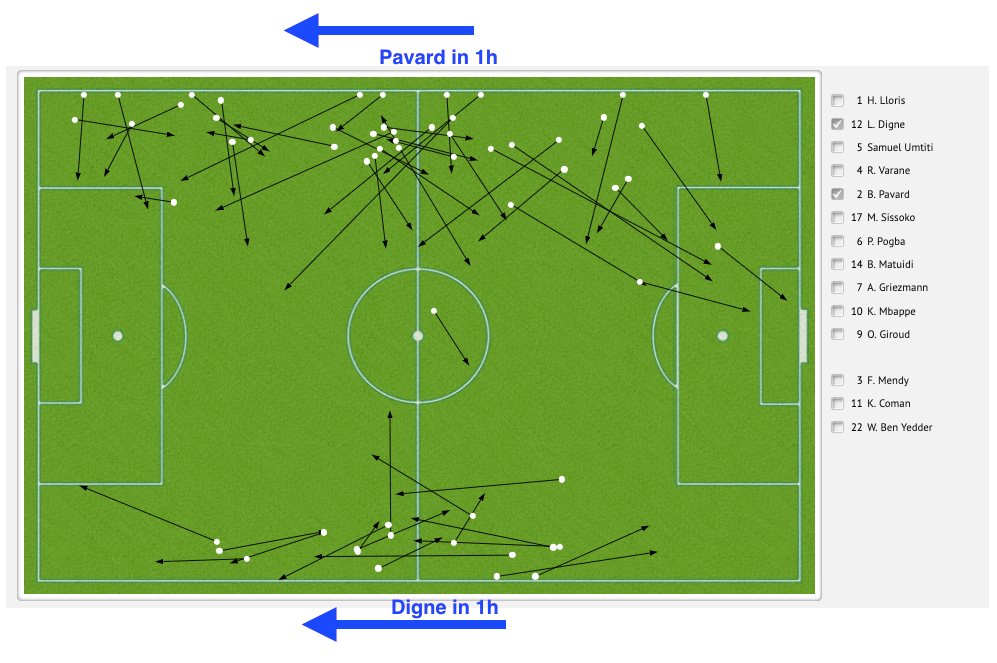
For all of France’s raised awareness, it didn’t extend to everyone, as Varane was pressed by Kahveci and lost the ball, yielding Yilmaz a nice chance, which Lloris saved well in the 38th minute. The Spurs keeper would save this effort, but was left hung out to dry a minute later.
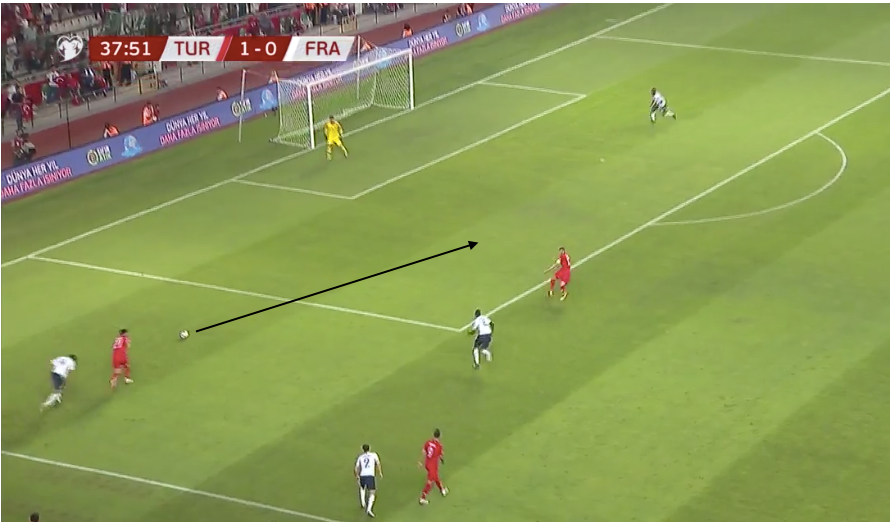
A long ball was contested and won by Varane, who headed it centrally to Umtiti, with Yilmaz pressing. He kept going and steamrolled Pogba and created a 3v1 for himself, Toköz and Cengiz Ünder who got the pass and finished it far post for 2–0.
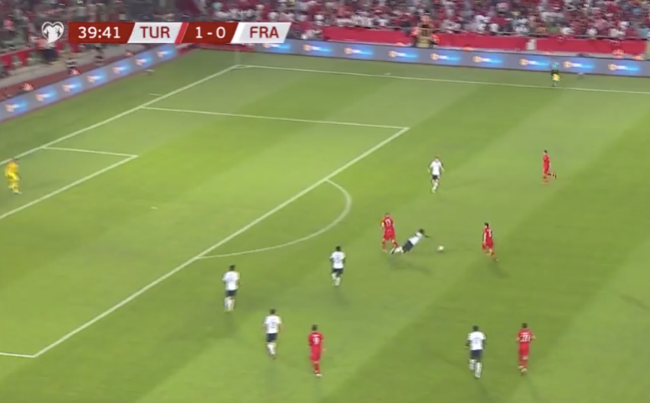

France reacted almost angrily, as exemplified by this NBA style isolation play for Mbappe, a clearout that Kawhi Leonard would enjoy.
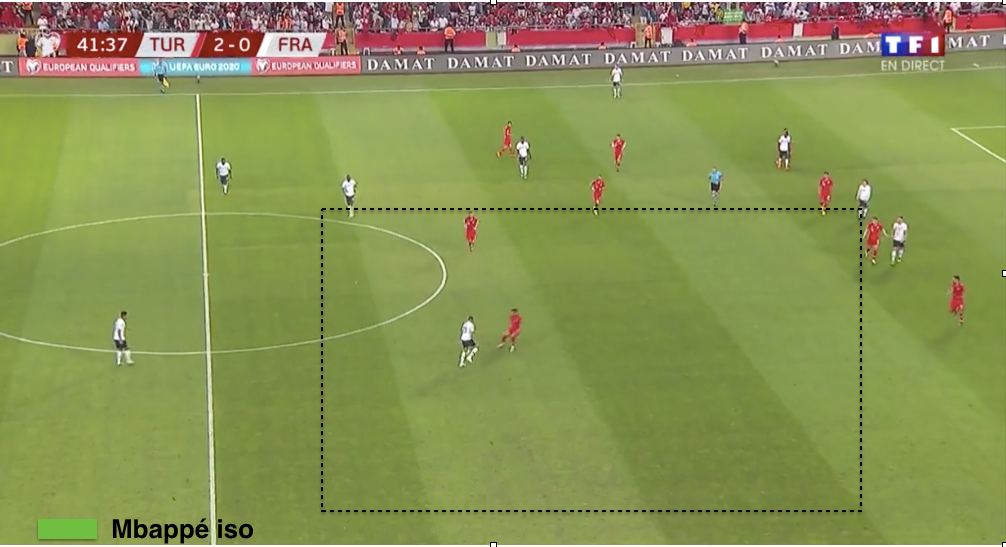
Yet, it was Turkey who could have made it 3 or 4 -nil with two chances: first, Celik made a great third man run again, after a flick on.
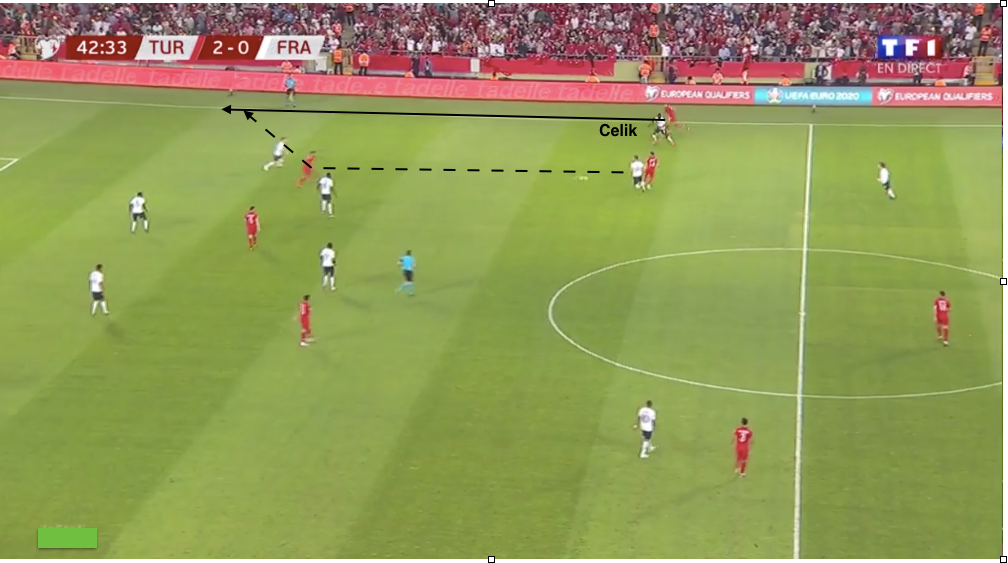
He pushed past Digne, who had to recover and was powerless to stop him and all Zeki needed to do was find one of Yilmaz or Karaman on the far post for the third goal.
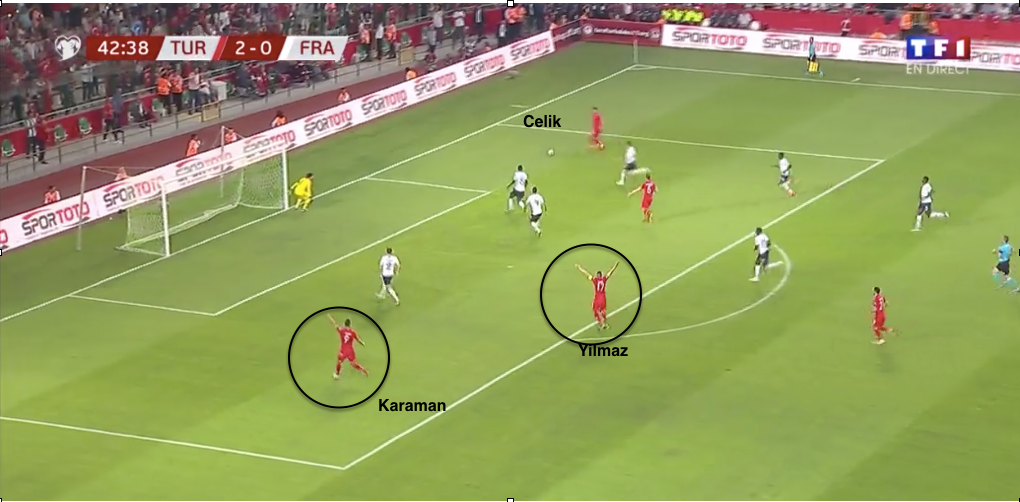
Demiral also had a decent chance with the last action of the first half, a header from a corner.
New left side, same results
Recognizing the timid left side of Digne and Matuidi, Deschamps brought on Kingsley Coman and Ferland Mendy to add dynamism, more combination play and better halfspace occupation at the break. That would lead to a lot of French possession, but because of the decision-making in the final third, some passed not executed due to bad timing, and Turkish defensive activity remaining high, it did not yield results.
Here are FOUR passes that France’s buildup players COULDN’T make due to poor execution and\or bad timing. Poor Olivier Giroud undoubtedly got a lot of flack for this match — winning 3 of 19 challenges is not great obviously — but one has to feel sympathetic for him making great runs and just not getting the ball.
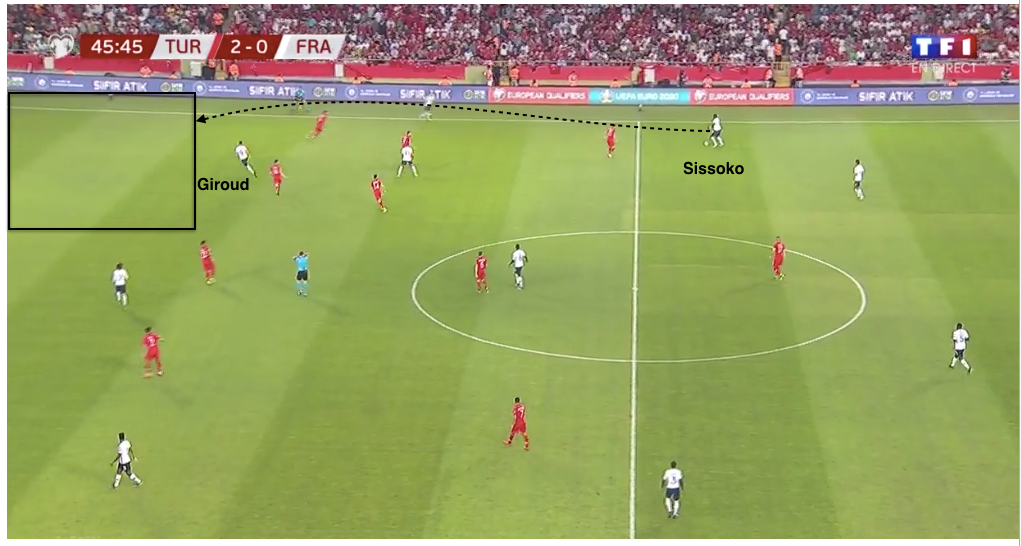
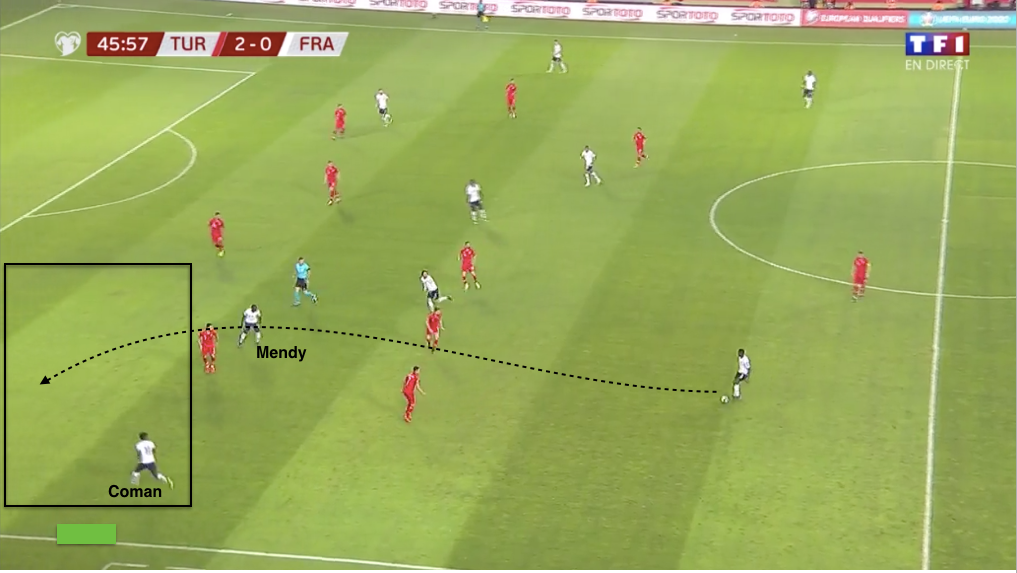
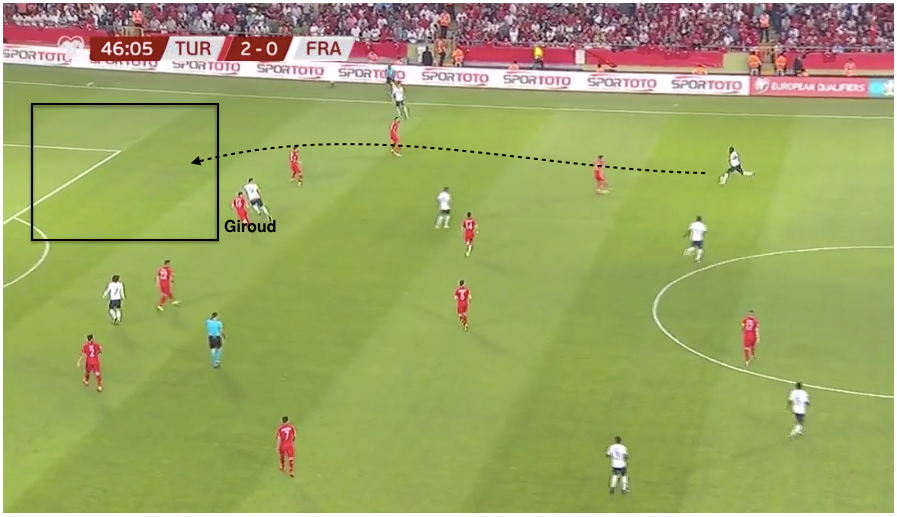

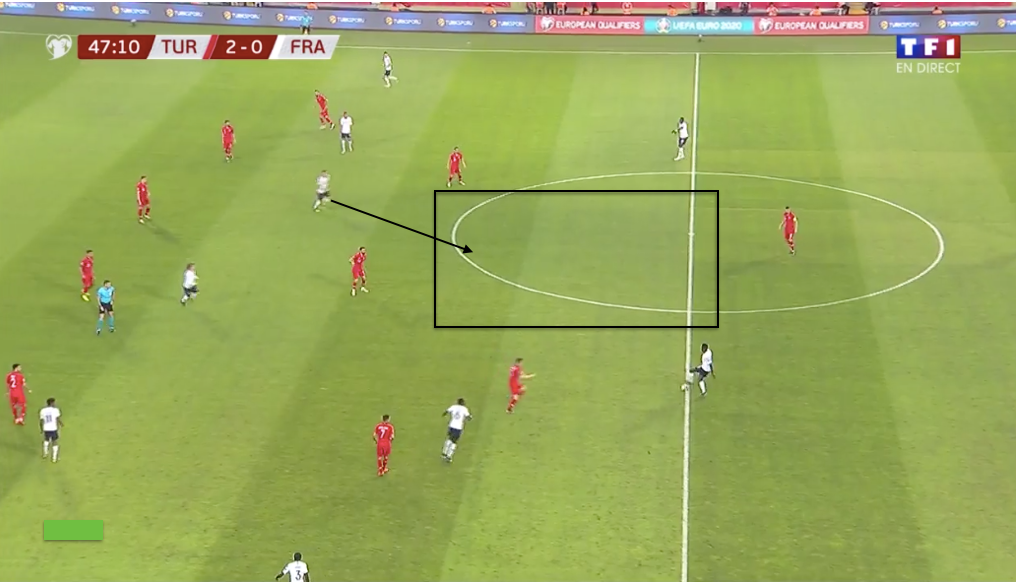
At around the 50th minute mark, Mbappé finally showed his class in transition: a couple lightning fast one-two passes and the ball was at Coman’s feet in the box. His low cross ended up with Griezmann, whose turnaround shot was well-blocked by Kaldirim, who low-key won 8 of his 9 total challenges on the day.
Turkey answered with Yilmaz, after Karaman had pressed and won the ball from Varane/Pavard, whose shot was saved well by Lloris in the 55th.
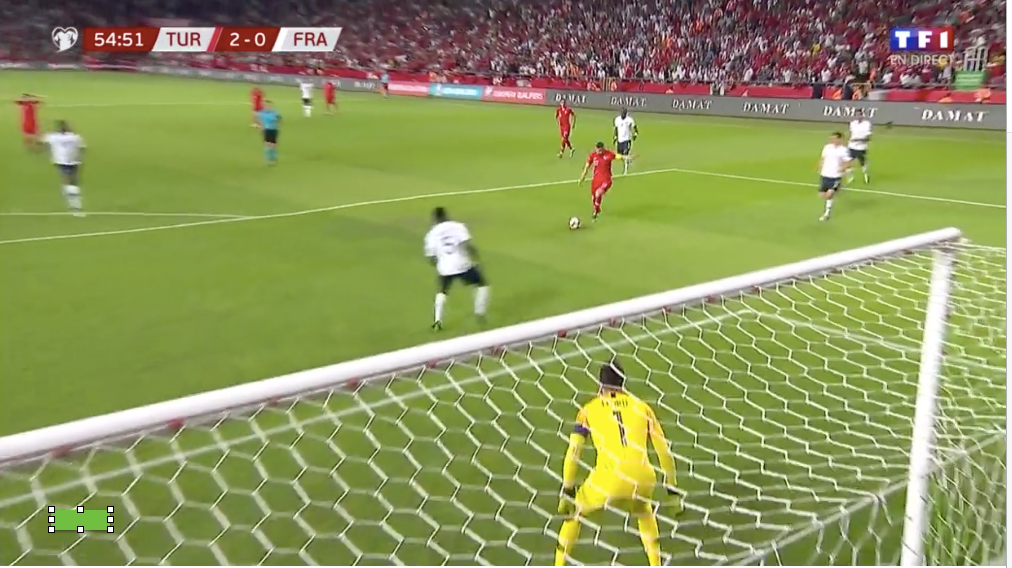
The Spurs GK pulled off an even bigger save on Karaman from the ensuing corner, a wide-open header from the back post from 3 yards. France could only muster a couple of feeble counters and some corners, but Giroud’s turnaround was blocked by several defenders. IT WOULD BE THE LAST FRENCH SHOT ATTEMPT OF THE MATCH (Giroud missing Griezmann’s header was almost a chance)
The match deteriorated in quality, as several Turkish players (not Celik, who kept bombarding down the right side) grew tired (Ayhan was cramping but continued), but such was the bluntness of Deschamps’ attack that after 65 minutes Turkey had to foul just three times. For the most part, Turkey was content with keeping defensive possession, though Günes’ team remained very dangerous on the counter when a long ball by Gönuk was won and either Karaman or Ünder would run off Yilmaz. This was easier as the match progressed since France pushed its fullbacks very high: Mendy often came inside on the left wing as an 8, while Pavard was playing as a de facto right winger. Wissam Ben Yedder replaced Giroud and offered a dribbling threat wide and a further connection inside, but would end up with just 11 actions and 7 completed passes in 22 minutes.
Turkey was the only dangerous team in the last 20 minutes, with the industrious Tekdemir’s long-range bomb nearly beating Lloris in the 70th, followed by Yilmaz shooting over the bar in the 75th. The 33-year-old was involved in a game-high 32 challenges and completed the most dribbles with 4 (7 attempts) and badly deserved a goal. He would come closest in the 85th after a superb run by Karaman (speaking of never getting tired) found him bearing down on Lloris and chased by Varane. His toe-poke finish went wide of the goal and the game ended 2–0.
The takeaways for France
Deschamps’ comments after the game are important, but we will have to wait and see what this game means. Against Andorra, it will likely not matter what XI he uses. The optimistic version is that the players didn’t really care enough to show up against a tough, organized Turkish side and after an exhausting season were checked out mentally. With 6 points in the bag, facing Andorra twice in the next 3 matches, and the top 2 going through automatically to Euro 2020, France are still overwhelming favorites to qualify. Losing one qualifier to Turkey, even in this fashion, should not, of course, undo the WC triumph, or resurface the philosophical doubts about Deschamps, but it will certainly add ammunition to his critics.
The future is bright for Turkey’s golden generation
In the last 20 minutes, Trabzonspor legend Günes was also able to use two of Trabzon’s talents, Yusuf Yazici and Abdülkadir Ömür, who are sure to be part of the next great Turkish national team. That future looks exceedingly bright, after some dark days under Lucescu. With four quality, top 5 league starter level CBs under 24 (Ayhan, Demiral, Kabak, Söyüncü) plus Celik, the defense is superbly set up. Berke Özer seems to be a generational talent in goal and is only 19. The aforementioned Ömür and Yazici alongside Kahveci and Toköz (plus Tekdemir who is 31) with whatever they can get from Ozyakup, Ozan Tufan, Yokuslu means a deep midfield. In terms of wide forwards or wingers Karaman and Ünder are supported by Hakan Calhanoglu, and maybe Yunus Malli can play as a number ten, though we’ve been waiting on that one for 5 years. Up top, Yilmaz is 33, so the present/future belongs to Tosun Pasa and Enes Ünal, or Güven Yalcin, who left Leverkusen’s U19 and scored 8 goals for Besiktas in his first professional season.
After all that it’s hard not to see this 2–0 win as the coming out party for Turkey’s next golden generation. The last one, of course, took third at the 2002 World Cup. Its coach was Senol Günes.

